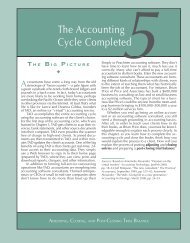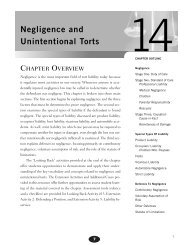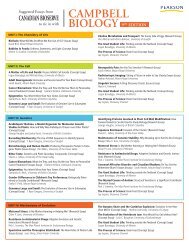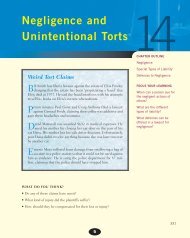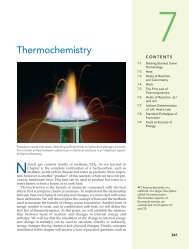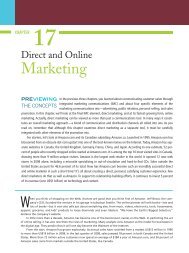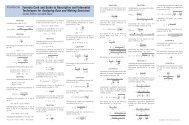PART Introduction to Cultural Anthropology - Pearson Canada
PART Introduction to Cultural Anthropology - Pearson Canada
PART Introduction to Cultural Anthropology - Pearson Canada
Create successful ePaper yourself
Turn your PDF publications into a flip-book with our unique Google optimized e-Paper software.
would provide evidence that such skills are passed on culturally<br />
through learning, not genes. They would say that<br />
parents socialize their sons and daughters differently in<br />
spatial skills and that boys are more likely <strong>to</strong> gain greater<br />
spatial skills through learning than girls, in general.<br />
Anthropologists who favour cultural construction and<br />
learning as an explanation for behaviours such as homicide<br />
and alcoholism also point <strong>to</strong> the role of childhood<br />
experiences and family roles as being more important<br />
than genes or hormones. Most cultural anthropologists<br />
are opposed <strong>to</strong> biological determinism and support<br />
cultural constructivism. However, some of them connect<br />
biology and culture in their work.<br />
Interpretive <strong>Anthropology</strong> versus<br />
<strong>Cultural</strong> Materialism<br />
Interpretive anthropology considers how people use<br />
symbols <strong>to</strong> make sense of the world around them, and<br />
how these meanings are negotiated. Interpretive anthropologists<br />
view culture as a contested domain, not a<br />
given. They favour an approach <strong>to</strong> ethnography that<br />
constructs a rich, complex description emerging from the<br />
insider’s point of view. Interpretive anthropology tries <strong>to</strong><br />
communicate this complexity, and rejects approaches<br />
that are reductionistic. For example, if Hindus in India<br />
say they don’t eat cows because cows are sacred, interpretive<br />
anthropologists would explore the meaning of<br />
food and eating within the Hindu religion. Similarly, an<br />
interpretive anthropologist like Mary Douglas argues<br />
that pigs cannot be eaten by Jews because of their taxonomical<br />
definition in Jewish belief as defined in the<br />
rules of Leviticus. The pig is a hoofed animal that does<br />
not chew its cud, unlike cows and sheep, and is categorized<br />
as anomalous and, thus, impure. Materialists have<br />
rejected such reasoning because the rules of Leviticus are<br />
untestable (Harris and Ross 1987:60).<br />
<strong>Cultural</strong> materialism emphasizes the importance of<br />
material conditions in studying and explaining human<br />
behaviours and ideas. <strong>Cultural</strong> materialists take as basic<br />
the material features of life, such as the environment,<br />
natural resources, and ways of making a living. Infrastructure<br />
is the term that refers <strong>to</strong> these crucial material<br />
fac<strong>to</strong>rs. Infrastructure largely shapes the other two<br />
domains of culture: structure (social organization,<br />
kinship, and political organization) and superstructure<br />
(ideas, values, and beliefs). <strong>Cultural</strong> materialists seek<br />
explanations for behaviour and ideas by looking first<br />
and primarily at infrastructural fac<strong>to</strong>rs. For example, a<br />
materialist explanation for a taboo restricting the eating<br />
of a particular animal first considers the possibility that<br />
such an animal plays a more important role alive, such<br />
as cows’ utility in agricultural work in India.<br />
The debate between interpretive anthropology and<br />
cultural materialism has a long his<strong>to</strong>ry in cultural anthropology,<br />
and its philosophical roots can be traced back <strong>to</strong><br />
Pla<strong>to</strong> (who emphasized that the only reality is ideas) and<br />
Aris<strong>to</strong>tle (who emphasized that there is some sort of reality<br />
that can be learned about through observation). These<br />
days, most cultural anthropologists take an approach<br />
that combines the best of interpretive anthropology and<br />
cultural materialism.<br />
Individual Agency versus Structural<br />
The individual agency versus structural debate concerns<br />
the question of how much individual will, or agency, has<br />
<strong>to</strong> do with why people behave and think the way they<br />
do, versus the power of forces, or “structures,” that are<br />
beyond individual control. Western philosophical<br />
thought gives much emphasis <strong>to</strong> the role of agency. The<br />
individual is supposed <strong>to</strong> be able <strong>to</strong> choose how <strong>to</strong><br />
behave and think. In contrast, analysts who emphasize<br />
the structural argue that “free choice” is an illusion since<br />
choices are structured by larger forces, such as the economy,<br />
social and political institutions, and ideological<br />
systems.<br />
A prime example is the study of poverty. Those who<br />
emphasize agency focus their research on how individuals<br />
attempt <strong>to</strong> act as agents, even in situations of extreme<br />
poverty, in order <strong>to</strong> change their situation as best they<br />
can. Theorists who see the world controlled by structures<br />
would emphasize that the poor are trapped by large and<br />
powerful forces. They would describe how the political<br />
economy and other forces provide little room for agency<br />
for those at the bot<strong>to</strong>m. An increasing number of cultural<br />
anthropologists seek <strong>to</strong> blend a structural perspective<br />
with attention <strong>to</strong> agency.<br />
Beyond the Debates: Holism at Heart<br />
<strong>Cultural</strong> anthropologists often take different theoretical<br />
positions. Some apply their work while others follow<br />
academic pursuits. But it is fair <strong>to</strong> say that cultural<br />
anthropologists are united in their interest in and care<br />
about humanity and its richly varied cultures.<br />
<strong>Cultural</strong> <strong>Anthropology</strong><br />
and Careers<br />
Some of you reading this book may take only one anthropology<br />
course <strong>to</strong> satisfy a requirement. Others may<br />
become interested in the subject matter and take a few<br />
more. Some will decide <strong>to</strong> major or minor in anthropology.<br />
Even just one course in anthropology can change<br />
CHAPTER 1 ■ <strong>Anthropology</strong> and the Study of Culture 27



